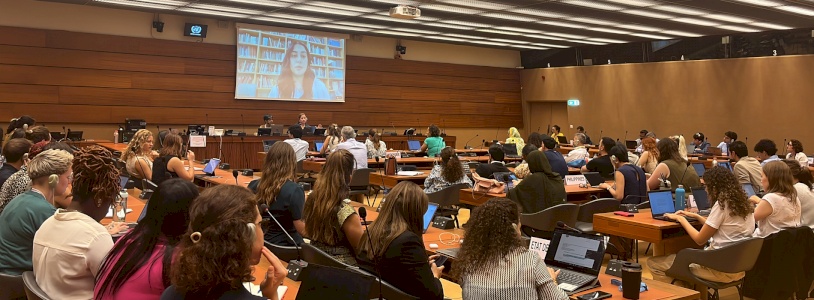Press Releases

Bethlehem, 23 June 2025
On 23 June 2025, BADIL Resource Center for Palestinian Residency and Refugee Rights hosted a side event at the 59th session of the UN Human Rights Council titled “The Israeli Genocide: Weaponization of Aid and Forced Transfer.” The hybrid event gathered over 70 participants, including representatives from UN bodies, state missions, civil society, and human rights defenders.
The event addressed Israel’s ongoing genocide, systematic displacement of Palestinians, and the obstruction and manipulation of humanitarian aid. Speakers emphasized that these policies are part of a decades-long strategy of domination carried out with impunity and enabled by international inaction and complicity. A key theme was the failure of states to uphold their obligations under international law. Speakers rejected the so-called Gaza Humanitarian Foundation, describing it as a tool to reinforce Israeli control, instrumentalize aid, and facilitate foreign military presence under the guise of relief. They called for urgent legal accountability and measures that uphold Palestinian rights, particularly self-determination and return.
Moderated by Pooja Badarinath (SRI), the panel included three UN Special Procedures experts:
- The UN Special Rapporteur on the occupied Palestinian territory, Francesca Albanese, in a recorded video, stressed that Gaza must be addressed through a lens of colonization and apartheid, and that humanitarian aid without political will and decolonization is insufficient.
- The UN Special Rapporteur on the right to food, Michael Fakhri, in a recorded video, reiterated that “Israel continues to use food as a weapon to displace, humiliate, harm and kill civilians without any accountability” and described how the deliberate denial of essential goods amounts to collective punishment and a form of starvation as a method of warfare.
- The UN Special Rapporteur on the rights of internally displaced persons, Paula Bentacur, in her in-person intervention, highlighted Israel’s "architected system of persecution, forced displacement, denial of aid, and destruction of civilian life" as clear elements of genocidal intent. Further, she called on the international community to “move from condemnation to accountability: restoring food and humanitarian access, ensuring protection for displaced communities, and supporting UN agencies, not undermining them.”
BADIL’s Representative, Sophia Al-Issa, called for concrete action under the Genocide Convention, including sanctions, arms embargoes, and support for Palestinian return, reparations, and decolonization.
The event also facilitated a dynamic exchange with the audience. A representative of the State of Palestine posed a critical question on states’ legal obligations to protect Palestinian refugees and defend UNRWA. Civil society participants raised concerns about the growing suppression of Palestinian solidarity movements across Europe and stressed the need to link the Palestinian struggle to broader decolonial movements, drawing parallels with struggles in Australia, and Jammu and Kashmir.
The event concluded with calls to end the genocide in Gaza, restore humanitarian aid under UN leadership, and dismantle the Gaza Humanitarian Foundation, widely condemned as a mechanism to entrench Israeli control and obstruct meaningful relief efforts.
